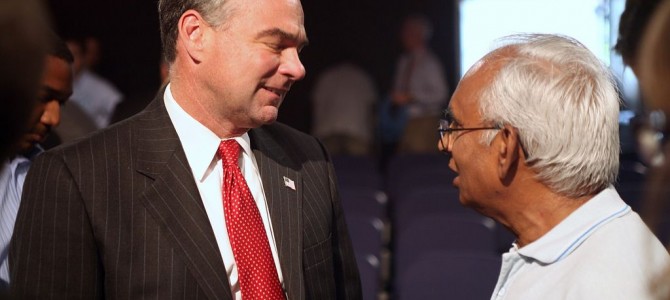
This year, for the first time in a long time, the Democratic nominee for president has the potential to capture the votes of a significant chunk of legitimately conservative, disaffected Republicans. Even though that nominee is Hillary Clinton. Seriously.
This is thanks to the GOP’s nomination this week of Donald Trump, a man who has previously advocated the same liberal positions on social issues that Clinton holds, hasn’t appeared to conduct himself in a particularly “family values” manner in his own personal life, and whom, as shocking as this may sound, many social conservatives consider far less capable of doing the actual job of president, far more likely to force the country into nuclear war, and thereby far less tolerable than even the much-reviled Clinton.
As weird as it seems, plenty of social conservatives out there will privately concede, if they trust the person they’re talking to, that they plan to vote for Clinton, and a lot of others are strongly considering it.
For these voters, vice presidential choice could matter. But unfortunately, one leading contender for that job has failed to position himself in way that accords with his apparent core beliefs, or in a way that enables him to be the one to lock these voters down in the Democratic column.
Tim Kaine’s Weak Record on Life and Justice
Virginia Sen. Tim Kaine is apparently a finalist on Clinton’s veep shortlist, and this may partly be because he’s known as a moderate Democrat who doesn’t scare religious conservatives on sensitive things like the right to life. (Other reasons Kaine is in contention include his Spanish language proficiency, roots in the potential swing state of Virginia, and bland and totally uncontroversial demeanor.)
Kaine is happy to talk about his Catholicism, he served as a missionary in Honduras, and the Obama team even deployed him to Liberty University as part of its social conservative outreach.
Over his political career, Kaine has talked a lot about sharing the Catholic Church’s stance on life issues—something that has not always endeared him to Virginia’s progressive grassroots, and something that increasingly looks like a mere rhetorical commitment to observers across the board. That, in turn, threatens to limit his utility to Clinton in an area where theoretically, against all odds, some inroads could conceivably be made.
Conservative commentators have often quipped there’s no such thing as a pro-life Democrat, and a survey of Kaine’s record bears this out more than passive observers of the Old Dominion’s junior senator might expect.
Virginia progressives have long taken issue not just with Kaine’s pro-life abortion pronouncements, but with the record (as opposed to the rhetoric) of the former governor, now-senator, on the death penalty. It has not gone unnoticed by politically active Catholics, either, who generally oppose the death penalty just as much as they oppose abortion—and not all of those voters are predisposed to voting Democratic in the first place.
While Kaine acted pro bono on behalf of prisoners on death-row back in the day, and vetoed the expansion of capital punishment as governor, he also pledged when running for statewide office that he wouldn’t act to stop the death penalty if elected. Kaine granted just a single commutation as governor, and oversaw the executions of 11 individuals.
One of them was Eddie Bell, whose clemency team contended a federal judge had condemned the performance of Bell’s original lawyers on constitutional grounds, Bell had an IQ of 68, he functioned at an intellectual level below 95 percent of the population, and that evidence of all of this—plus fresh evidence benefiting Bell—was never heard by a court.
The Supreme Court banned the execution of mentally disabled people in its Atkins v. Virginia decision, a ruling handed down just a few years before Kaine’s election to the governorship; Bell was executed anyway.
A Missed Opportunity
Kaine himself seems to regret failing to do more to stop the death penalty, telling the Washington Post several years ago, “I hope I can give a good accounting of myself on Judgment Day”—maybe not the best indicator of how he sees himself on an important life issue.
If progressives familiar with Kaine’s record are unhappy with this aspect of it, at least they can console themselves with Kaine’s recent pro-choice shifts on abortion.
Once passed over for endorsement by Virginia’s NARAL chapter because he was too pro-life in an election where the same chapter rabidly opposed the Republican, in the Senate Kaine has secured a 100 percent rating from the national-level group for three straight years now. This bears repeating: 100 percent.
Kaine opposes merely defunding Planned Parenthood. He applauded the recent Supreme Court decision in the Texas abortion-regulation case. He is a co-sponsor of a bill that would block states from setting their own (pro-life) policy. If you’re Planned Parenthood CEO Cecile Richards, this is great stuff. If you’re a social conservative looking for a reason to vote for Clinton, this is beyond bad, and doubly disappointing, given where Kaine originated on abortion.
Kaine may prove to be a big value-add if he’s chosen, but the reality is, if he held his old positions on abortion and those that presumably undergirded his pro bono, death-row defense lawyer work, he could be much more of an asset to Democrats in this year, especially. As it is, if selected, he’s not going to give disaffected conservatives who can’t support Trump much reason to look beyond writing in, staying home, or voting for Gary Johnson—and that is the dictionary definition of a missed political opportunity.









